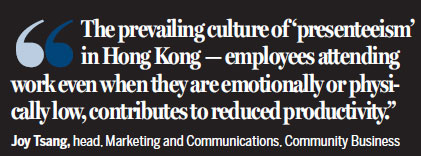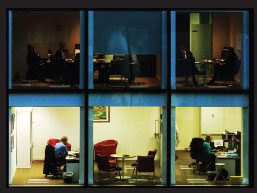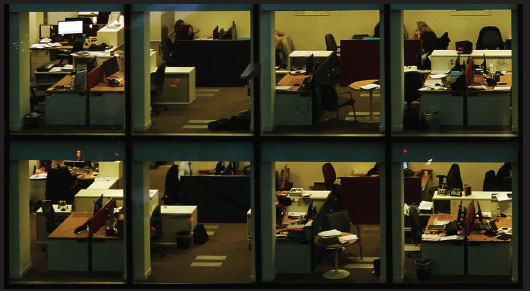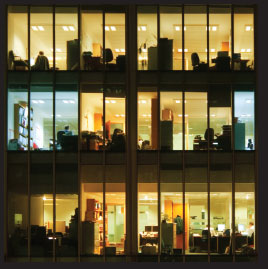Is overtime over?
Updated: 2015-09-30 09:48
By Wang Yuke(HK Edition)
|
|||||||||
A huge section of HK's employed keeps long hours at work, without getting adequately compensated. The trend does not augur well for the city's future, as sociologists tell Wang Yuke.
Employers in Hong Kong would soon have to deal with an even more serious brain drain than it already is, given the current labor management practices, warns Joy Tsang. Tsang heads Marketing and Communications of Community Business, a non-government organization campaigning for work-life balance, which tends to get increasingly disrupted. The problem is compounded by the fact that many aren't paid for working overtime.
Employers pocket the extra coin from workers forced to work extra hours without pay, agreed Poon Man-hon, policy researcher from the Hong Kong Confederation of Trade Unions.
Poon argued that any employee working beyond 44 hours a week and drawing under HK$15,000 should be paid "time-and-a-half" for overtime, based on the hourly wage.
"The government estimates that the total amount of extra wages due to all employees denied hours of free time should be around HK$10 billion," Poon said. "According to a policy study on standard working hours carried out by the government in 2012, a quarter of Hong Kong's employees were required to work overtime, and half of those received no compensation."
Poon cited the example of a cook, working 12 hours per day - the standard in the restaurant industry - and making HK$40 per hour. Daily wages add up to HK$480. Then this is against the more universal standard of eight-hour work day. Poon argues cooks should be making HK$60 dollars for every additional hour they put in. Employees who receive no compensation for extra hours feel their work is disrespected and become resentful, said Poon. They start looking for work elsewhere.
"Employees should be properly compensated if they are required to work overtime. Another alternative is to offer flexible work arrangements, to create a better work-life balance," remarked Joy Tsang from Community Business.
A local job hunting website JobsDB.com carried out an online survey based on responses from 2,400 Hong Kong workers in service, finance, engineering, media and communications etc. from May to June. A whopping 62 percent of those polled said they were moderately or intensely unhappy at work. Half said they hoped to leave their positions for better jobs within the next 12 months. Among those unhappy workers, 46 percent pointed to minimal work-life balance.
According to the Work-Life Balance Survey undertaken by Community Business and the Public Opinion Programme at the University of Hong Kong (HKU) in 2014, roughly 30 percent employees admit to contemplating seeking new jobs offering better work-life balance. Younger workers, eager for rewarding social lives, are more prone to changing jobs. Tang stressed that if Hong Kong employers alienate young workers, there will find it even harder to retain their skilled personnel.
Longer than the rest
Hong Kong is one of the most hard-working cities, reporting the longest work hours in the world, according to a 2014 Report on Annual Earnings and Hours Survey by Census and Statistics Department of the HKSAR.
Hong Kong workers spend an average of 2,300 hours at work every year. The average among OECD (Organization for Economic Cooperation and Development) nations is 1,700 hours, Poon said, citing the government's report.
While the median for weekly hours of work in Hong Kong is 45.3, more than 306,000 workers, equivalent to 10 percent of the total workforce, work 60 hours per week, or more, as suggested by the report.
Although extra hours are not mentioned in the contract, workers are supposed to report to duty when summoned during off-hours, contended Joseph Wu Keung-fai, assistant professor, Department of Applied Social Sciences, City University of Hong Kong.
Workers are scared of displeasing employers by refusing to put up with exploitation, Wu said. All the same time, the unfair treatment de-motivates them.
A sales manager from a Hong Kong Insurance company, who asked to be called Amy Ng, described spending the last public holiday, Sept 3, meeting potential clients at her office. Her colleagues, she said, was gripped by a never-ending sense of crisis. Staff cuts have become ritual when the company hits difficult times.
The pressure on her, she says, comes from her superiors, and co-workers, who compete for top sales. "Our boss holds meetings almost every day. He congratulates the achievers and cites the names of those who have fallen behind. It's supposed to encourage those workers to do better," she said, wincing.
Employers appear to take comfort from keeping workers under their thumbs. That mirrors an established management culture mindset called "face time". Managers feel secure and reassured only if the employees are visible, explained Tsang. Else they suspect employees are slacking off.
She said many companies in Hong Kong are concerned that if they start offering flexible working hours, employees will work fewer hours, affecting productivity. "They also are worried about opening the floodgates - offering flexi-time to an employee will have everyone else demanding it," added Tsang.
However, this is a misunderstanding, as flexible time does not mean fewer hours. It just means that working hours are not fixed, she said.
Poon said he believed insufficient manpower is the major reason for overtime work. "Employers refuse to hire more workers, because they want to cut costs and maximize profits. The alternative is to compel their employees to work longer hours," Poon argued. "For example, a cook at a popular fast food chain complained that his restaurant reduced the number of cooks from 15 to 7. So he now has to work 14 to 16 hours per day."
Professor Wu held that under the capitalist system, the belief that lowering overhead to maximize profits is entrenched.
Employers focus on immediate cost and profit at the expense of workers, echoed Tsang. Some of them want their staff to be at their beck and call 24X7.
"In many companies, managers give mobile phones to their employees. The company pays the monthly service charges, on condition that the worker who gets the phone, be on 24-hour call," said Siu Oi-ling, head of the Department of Applied Psychology at Lingnan University, specializing in occupational health psychology.
The business cycle in the global community operates round the clock. The work culture demands that employees be ready at all times to serve international clients. The corporate mentality strives to earn extra profits at the expense of employees who are forced to work extra hours, without recompense. A missed call from an international client, or an e-mail not opened, could cost the company dearly.
"With social media becoming the norm, you cannot dodge a phone call or WhatsApp message from your boss. Ultimately, employees can be located and ordered to work whenever and wherever they are," said Francis Lee Lap-fung, associate professor at the Chinese University of Hong Kong, who studied the impact of digital technology on the job landscape.
Present please
Extensive research by Siu and other experts confirm that job dissatisfaction compromises physical and emotional health of employees. Common physical symptoms include stomach trouble, cardiovascular problems and insomnia. Workers' taking sick leave affects productivity at the end of the day.
A finding published in the European Heart Journal shows that people who regularly work more than 10 hours a day run a 60 percent higher risk of getting a heart condition. That is to say one out every 10 workers in Hong Kong who work more than 60 hours a week is at risk, as Poon contends.
The Work-Life Balance Survey, by Community Business and the HKU in 2012, found a correlation between workers' discontent with long working hours and decreased working efficiency. Among the 1,002 full-time respondents, a third felt they were less efficient on days when anticipate being asked to work late. Another 26.7 percent reported taking "sick leave" in the previous 12 months, because they were too tired to go to work.
"The prevailing culture of 'presenteeism' in Hong Kong - employees attending work even when they are emotionally or physically low, contributes to reduced productivity. Unhealthy employees cannot work to their full capability," noted Tsang. Therefore, long work hours could in fact translate into less work, she said.
Professor Siu supports "Family-friendly Employment Policies and Practices" in a proposal to the government. These entail urging Hong Kong employers to introduce flexible working hours, so that a genuine work-life balance may be established. The proposed flexible work arrangement policy encourages employers to permit staff to work at home occasionally, connected online to their offices. Siu also advocates a compressed work week and more frequent half-days off.
Professor Wu said unlike in the European countries, Hong Kong does not have a strong tradition of organized labor unions to protect employees from overwork.
The European Commission strictly regulates a limit of 48 hours per week, including overtime. The minimum time between work shifts, by statute, is 11 consecutive hours.
Employees forced to work beyond that limit may report their cases to the government. Employers in breach of the labor law face prosecution in European countries.
Wu argues it is the lack of law enforcement that enables Hong Kong employers to exploit their workers without consequence. The fact that ordinary working people value job security merely exacerbates the problem of worker exploitation. Who wants to make a complaint about the boss only to get fired?
Germany, troubled by a similar problem, stepped up to address the issue. In 2013 its employment ministry limited out-of-hours e-mails and calls to 30 minutes beyond the time an employee completes his shift.
Positive reinforcement plays a key role in creating maximum job satisfaction, observed Siu.
"When employers receive recognition from their leaders, their confidence and self-esteem are strengthened. Employers in Western countries put a high premium on acknowledging their staff's contributions. I hope Hong Kong employers can take their cue from their Western counterparts."
Contact the writer at jenny@chinadailyhk.com






(HK Edition 09/30/2015 page11)